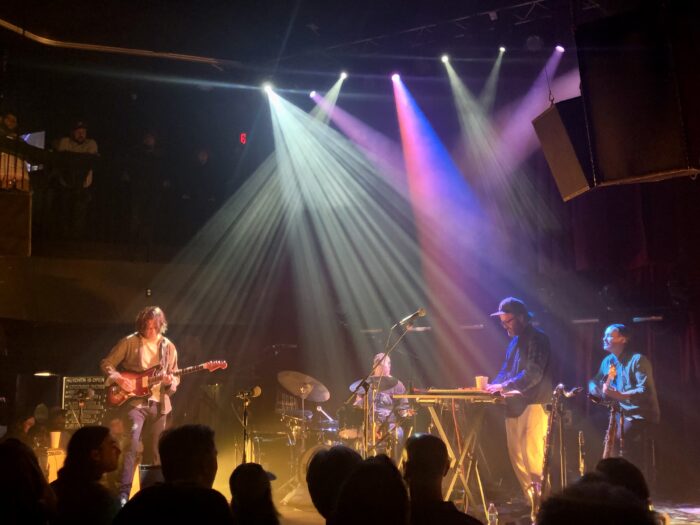As the seabird flies, there’s 3,000 miles of North Atlantic menace between Floki Studios, the otherworldly Icelandic outpost where Joe Russo’s Selcouth Quartet recorded its debut album, and Ardmore Music Hall, the unassuming suburban cabaret that played host to the quartet on March 20, amid its first extended tour.
The performance spanned 87 minutes, largely exploring the instrumental tracks on the eponymous album released in June 2023 – with room, of course, for some Russo-driven improvisational flair.
Shortly after 9 p.m., the band began in cool ambience that inhaled and exhaled like soft waves lapping against icy rocks at the top of the world. Guitarist Jonathan Goldberger bowed his Fender Jazzmaster to eerie effect as Stuart Bogie’s clarinet joined in contemplation. Some foliage behind Russo’s drum kit could have been mistaken for mood-setting decoration, but the drummer placed the bushel of fronds on his cymbals as he added tip-tap intrigue to the soundscape.
The moody ambience of “Smaller Horses” and “Hidden People” gave way to angular rhythms as the band worked “Dragon, Bull, Vulture, Giant” up to a frenzied climax. Atop a dark but catchy bass line fortified by Bogie’s blows, Goldberger let loose in jagged runs that evoked Miles Davis’s early electric bands.
To fans unfamiliar with Russo’s work outside his Almost Dead project, the sound may have been foreign. But the Selcouth Quartet is comprised of frequent Russo collaborators who have plumbed abyssal depths and scaled high peaks together before: Bogie tapped Russo for his horn-heavy Bogie Band among other outings; bassist Jon Shaw has taken up rhythmic duties with Russo on tour with Cass McCombs plus the occasional Almost Dead date; and Goldberger (along with Bogie) joined the prolific drummer in Pirata, a one-off, all-improv project that Russo staged for two late 2019 shows in New York City.
The Selcouth Quartet’s Ardmore concert contained traces of each of these collaborations as it oscillated between anthemic odd-time propulsion and valleys of emotional subtlety. The set saw Russo draw from his electro drum-and-bass Shpongle leanings, even spinning away from the kit at times to punch out melodies on a keyboard to his left. Russo turned to that keyboard during “Gyr” as Bogie chugged on the esoteric but unmistakable jaw harp, and Goldberger strummed with a shoegaze edge.
Turning back to the kit, Russo kicked off a new song written since the album release. His tom-driven groove along with Bogie’s bebop sax lines were delivered in stark contrast to Shaw’s unrelenting bass line and Goldberger’s spaceship effects. It was if the Buddy Rich Big Band had collided with Sun Ra’s Arkestra in some black hole, only to be spit out in suburban Philadelphia in 2024.
High tide had arrived with that raucous moment but the waves receded just as quickly, leaving time to stroll the rocky shore and admire its solemn beauty.
While “Gyr” established a more unsettling ambience, one of the show’s most moving moments came during “Limited Light,” as Bogie filled the room with classical melodies set against Goldberger’s flitting and soft sleigh bells from Russo. A droning swell backed this saccharine scene like some Nordic raga, timeless yet moored to the moment.
As might be expected from a professional thumper, Russo soon rallied his Selcouth soldiers for a final run toward Valhalla. In lockstep with Shaw’s deep and flawless pocket, the group descended from the ambient stratosphere and hit the ground running on “100 Words For Wind.” Goldberger once again unsheathed his ax to attack the groove with torrents of beautiful chaos. If ECM had signed John McLaughlin and his Mahavishnu Orchestra at the height of their 70s prowess, it may have sounded like one of these ferocious passages.
“Before We’re Sunken” brought the evening to a close with Russo back on his keyboard to trigger the song’s vocal and drum samples. After a melancholy intro that could have scored a pivotal scene in a turn-of-the-century indie film, Russo cut in with his real drums and the band jumped on for the ride. One final high-flying electro-clarinet thrashing added an exclamation point to a transcendent evening of music.
It was during a mid-set transmission some minutes prior that Russo stated plainly: the group had made a record and then learned that record to play for the audience. Far from novel, this is how most of the world’s touring bands operate. Only in an improv-heavy scene like the one in which Russo often finds himself would this seem unique. Yet, this Selcouth Quartet performance was far from a mere recapitulation of the songs on that album. The group reached explosive heights and conveyed universal truths on the stage – truths that otherwise may have been left up in the icy tide at the tip of civilization.



No Comments comments associated with this post